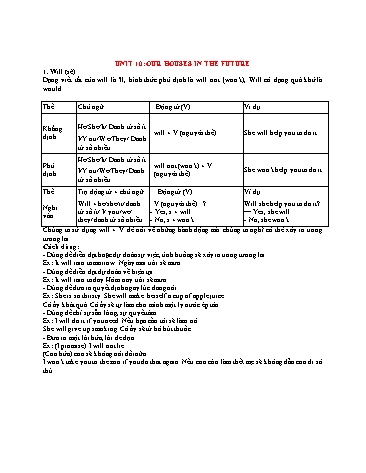Đề ôn tập môn Tiếng Anh Lớp 6 - Unit 10
Bạn đang xem tài liệu "Đề ôn tập môn Tiếng Anh Lớp 6 - Unit 10", để tải tài liệu gốc về máy hãy click vào nút Download ở trên.
Tóm tắt nội dung tài liệu: Đề ôn tập môn Tiếng Anh Lớp 6 - Unit 10

UNIT 10: OUR HOUSES IN THE FUTURE
1. Will (sẽ)
Dạng viết tắt của will là 'll, hình thức phủ định là will not {won’t), Will có dạng quá khứ là
would.
Thể Chủ ngữ Động từ (V) Vi dụ
Khẳng He/She/It/ Danh từ số ít
will + V (nguyên thể) She will help you to do it.
định I/Y ou/W e/They/ Danh
từ số nhiều
He/She/It/ Danh từ số ít
Phủ will not (won’t) + V
She won’t help you to do it.
định I/Y ou/We/They/ Danh (nguyên thể)
từ số nhiều
Thể Trợ động từ + chủ ngữ Động từ (V) Ví dụ
Will + he/she/it/ danh V (nguyên thể)...? Will she help you to do it?
Nghi
từ số ít/ I/ you/ we/ - Yes, s + will. — Yes, she will.
vân
they/ danh từ số nhiều - No, s + won’t. - No, she won’t.
Chúng ta sử dụng will + V để nói về những hành động mà chúng ta nghĩ có thể xảy ra trong
tương lai.
Cách dùng:
- Dùng để diễn đạt hoặc dự đoán sự việc, tình huống sẽ xảy ra trong tương lai.
Ex: It will rain tomorrow. Ngày mai trời sẽ mưa.
- Dùng để diễn đạt dự đoán về hiện tại.
Ex: It will rain today. Hôm nay trời sẽ mưa.
- Dùng để đưa ra quyết định ngay lúc đang nói.
Ex: She is so thirsty. She will make herself a cup of apple juice.
Cô ấy khát quá. Cô ấy sẽ tự làm cho mình một ly nước ép tảo.
- Dùng để chỉ sự sẵn lòng, sự quyết tâm.
Ex: I will do it if you need. Nếu bạn cần tôi sẽ làm nó.
She will give up smoking. Cô ấy sẽ từ bỏ hút thuốc.
- Đưa ra một lời hứa, lời đe dọa.
Ex: (I promise) I will not lie.
(Con hứa) con sẽ không nói dối nữa.
I won’t take you to the zoo if you do that again. Nếu con còn làm thế\ mẹ sẽ không dẫn con đi sở
thú. 16. motorhome /ˈməʊtəˌhəʊm/ (n): nhà lưu động (có ôtô kéo)
17. skyscraper /ˈskɑɪˌskreɪ·pər/ (n): nhà chọc trời
18. smart /smɑːrt/ (adj): thông minh
19. solar energy /ˌsoʊ.lɚ ˈen.ɚ.dʒi/ (n) năng lượng mặt trời
20. space /speɪs/ (n) không gian vũ trụ
21. special /ˈspeʃ·əl/ (adj) đặc biệt
22. UFO /ˌjuː.efˈoʊ/ viết tắt của từ Unidentified Flying Object (n) vật thể bay, đĩa bay
-----------------------------------------------------------------------------------------------------------------
EXERCISES FOR UNIT 10: OUR HOUSES IN THE FUTURE
I. PRONUNCIATION
A. Choose the word whose underlined part is pronounced differently from the others.
1. A/ bag B/ had C/ dance D/ father
2. A/ voice B/ noisy C/ doing D/ boil
B. Choose the word whose main stress pattern is not the same as that of the others.
1. A/ reduce B/ polluted C/ recycle D/ understand
2. A/ rubbish B/ energy C/ pollution D/ animal
3. A/ banana B/ apple C/ planet D/ charity
II/ MULTIPLE CHOICE
1) We also watch films............ smart phones.
A. in B. to C. at D. on
2) Do you think we will.................... holiday to the Moon?
A. go B. go on the C. go on D. go for
3) It’s Sunday tomorrow, so I... have to get up early.
A. will B. won’t C. can D. can’t
4) We might have robots ................. our meals.
A. cook B. to cook C. cooking D. to cooking
5) A hi-tech robot will help us ................ children while we are away.
A. look out B. look at C. look in D. look after
6) I would like to have my house by the................. so we can see the beach from my
window.
A. mountains B. city C. sea D. countryside
7) We might have a ................. TV to watch TV programs from space.
A. wireless B. remote C. automatic D. local
8) If the weather good, I camping with classmates.
A. is / will go B. is / go C. will be / go D. will be /
will go
9) We shouldn’t .. rubbish on the street.
A. turn off B. wrap C. throw D. turn on
10) Turn . the tap when you brush your teeth. 1/ In the future, robots will be able to make coffee. (Rewrite )
In the future, robots can
2/ The soil is polluted. Plants die . (Combine the sentences with If – type 1 )
If the soil
3/ Home robots can do the housework . (Change into Negative form )
Home robots
4/ be able to/ robots/ Will/ recognise our faces/ ? ( Rearrange the words in the correct
order)
File đính kèm:
 de_on_tap_mon_tieng_anh_lop_6_unit_10.doc
de_on_tap_mon_tieng_anh_lop_6_unit_10.doc

